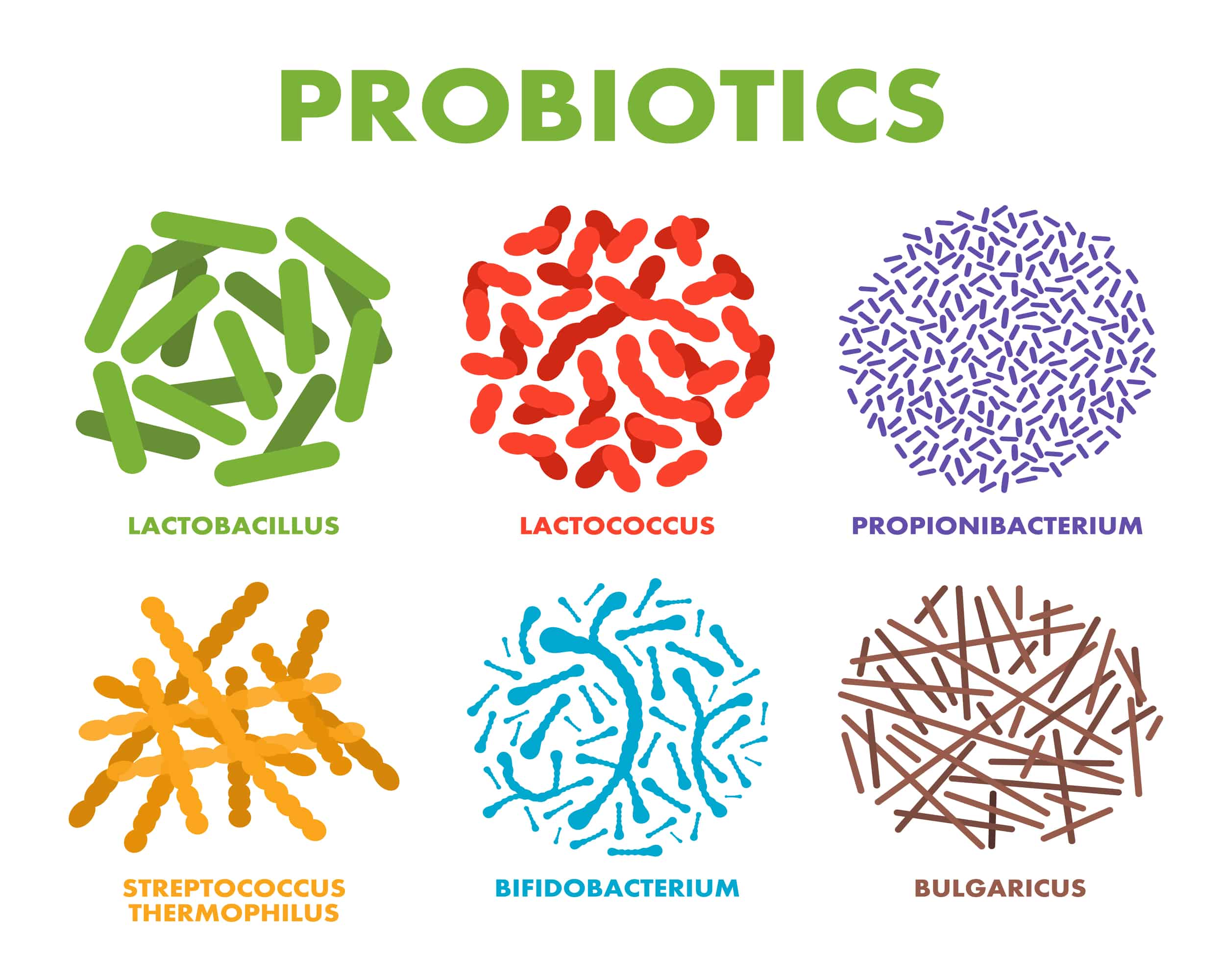Have you ever thought about taking probiotics? You might have hesitated to use them because you don’t know much about this supplement. Probiotic supplements contain living microorganisms such as virus, fungi, and bacteria that provide various benefits, such as supporting our healthy gut bacteria.
You might be wondering how ingesting live bacteria or yeast could be beneficial to our health? In this article, we will explore probiotics thoroughly. We will take a deep dive into the different properties of probiotics and check out what is the best time to take probiotics. Do stay with us!
WHAT ARE PROBIOTICS?

Probiotics are supplements which help increase the number of healthy bacteria in our body. According to scientific evidence, our digestive system acquires bacteria at birth and afterwards through a process known as colonization.
Most of them are beneficial to our body because their function involves the conversion of fiber to short-chain fatty acids, assisting immunity and amalgamate certain vitamins. Consuming probiotic supplements could improve the numbers of healthy bacteria in our gut.
Composition of Probiotics
Bifidobacterium and lactobacillus are the most commonly consumed probiotic species. They are usually found in food and supplements as well as in combination with other subtypes of species. They are also labelled on supplement bottles as CFU (colony forming unit) usually like L. Acidophilus.
Probiotics can be found in fermented food like kefir, yogurt and sauerkraut or supplements. According to a research study, probiotics are usually favorable to the intestinal flora.
Probiotics often contain lactic acid bacteria. Gram-positive lactic acid bacteria such as streptococcus and Lactococcus are indeed considered important components.
Types of Probiotics
Probiotics are available in different forms like droplets, powders, lozenges, and capsules. They are also included in some milk products and beverages.
There are six types of probiotics strains which are usually found in food products or supplements.
1. B. Animalis : Helps with digestion and resisting harmful bacteria through increasing immunity.
2. B. Breve : Plays a role in the absorption of nutrients and breaks down fiber into a digestible form.
3. B. Lactis : Found in milk products and cheese, it helps boost immunity.
4. B. Longum : A vital antioxidant that breaks down carbohydrates.
5. L. Acidophilus : Helps in guarding off vaginal bacteria and is usually found in soy products and yogurt.
6. L.Reuteri : According to scientific evidence, it helps decrease bacteria which causes tooth decay.
WHAT IS THE BEST TIME TO TAKE PROBIOTICS?
The time of consumption of probiotics could play a pivotal role in its absorption and beneficial effects. Some pharmaceutical firms mention on the supplement whether to ingest it with food or on an empty stomach in the morning.
According to a research study on the impact of mealtimes on survival of probiotic microbes, the survival of bacteria was best when taking a probiotic 30 minutes before a meal or with a meal or a drink containing fat.
It was also noted that apple juice and spring water played a negative role and decreased bacteria survival rate and the endurance was poorest when probiotic was taken after a meal.
While it is difficult to calculate each bacteria’s viability, the research suggests that Bifidobacterium and lactobacillus have more survival chances, particularly when the probiotic is taken 30 minutes before a meal. The study also revealed some micro-organisms may survive irrespective of meal timings.
Supportive Diet Ingredients
It is important to note that your meal components could be hindering the effects of a probiotic. According to a research, meal ingredients play a vital role.
It was observed in the study that the microorganisms’ survival rate was much higher among subjects which took probiotic supplements along with low-fat milk or oatmeal. Also, minimal quantities of fat may increase the chances of bacteria survival in our gastrointestinal tract.
Probiotics Pharmacokinetics
Probiotics will work according to the condition we try to treat. They can work quickly to relieve abdominal pain or diarrhea, but need to be taken over longer periods of time to have a beneficial effect on our immunity system.
A study shows that individual health, dose, and quality of supplement are also considered important factors in measuring the effectiveness of probiotics because each company labels the uses and dosage differently.
According to some literature, consuming a high dose of probiotics for 12 weeks or more may help in the reduction of respiratory tract infections and increase antibody levels in the body. This shows that a minimum of 12 weeks is required to ensure the proper effect of probiotics.
Another study from 2011 reveals that it takes 4 weeks for people with IBS to see improvements for their chronic disease symptoms.
Quality Over Timing
Apart from considering proper timing, it is also necessary to choose the correct probiotic supplement to ensure its effectiveness. One research points out the importance of checking the label of the probiotic supplements as it should contain 100 million to 1 billion probiotic microorganisms.
Meanwhile, another scientific study proposes that probiotics should not be taken after their expiry date due to the presence of live microorganisms, which after dying may leave toxicity behind. Probiotics should normally be refrigerated to ensure safe usage.
BENEFITS OF CONSUMING PROBIOTICS
Probiotics provide numerous health benefits, yet it is crucial to make sure that probiotics are taken at the correct time and consultation with your dietitian or a family doctor is necessary before including or consuming probiotics so as to ensure its safety and efficacy. Below lists out some potential health benefits of taking probiotics.
Foster Oral Hygiene

As a matter of fact, our mouth contains various pathogens. Some may actually cause plaque. According to a study done in 2016, it points out that probiotics contain a strain known as A12 bacteria which prevents the formation of cavities.
Probiotics can also treat common gum diseases such as gingivitis. In 2006, a randomized control trial research study proved that subjects who consumed probiotics supplements for two weeks showed drastic improvements in gum inflammation as compared to the group of people who were kept on a placebo supplement.
Help Nourish Skin
Probiotic supplements can play an effective role in improving our skin. Probiotics are now available in topical form as well. One recent study suggests that probiotic bacteriotherapy helps in prevention of various dermatological conditions such as eczema, dermatitis, inflammatory skin conditions, acne and it may also be used for cosmetic purposes.
Another research study on the effects of probiotics on acne and immune regulation suggests that probiotics increase the production of ceramides which obstruct moisture in skin and protect the skin from bacteria causing acne. It may also help with eczema because people with eczema usually have low levels of ceramides.
Promote Heart Health
The heart is a vital organ of the body and plays a major role in pumping blood around the body as well as delivering oxygen. It is thus of utter importance to keep our blood pressure within normal range in order to lower the risk of heart disease and keep our body proper functioning.
You may be surprised to know that probiotics can drastically reduce blood pressure. A clinical trial among smokers who took probiotics for 6 weeks showed significant reduction in blood pressure. It could be used primarily for prevention of atherosclerosis in smokers.
Probiotics also play a pivotal role in the reduction of bad cholesterol known as triglycerides. Increase in levels of triglycerides may lead to heart diseases. According to clinical trails on the effect of probiotics in lowering serum triglyceride levels, 12 weeks of probiotics intake result in a great reduction of TGL levels among the participants.
Improve Mental Health
The gastrointestinal tract and nervous system are connected through the vagus nerve, so any changes in the gut may also affect brain functions. A recent study has suggested that mental disorders such as depression, anxiety and stress can be treated by using a probiotic supplement for 8 weeks, however still more research is needed to measure its potential effects on the human brain.
A randomized controlled trial on mood disorders showed that people who consumed a milk probiotic supplement for 3 weeks showed improvement in mood as compared to how they felt before the initiation of the treatment.
On the other hand, the participants’ memory test was much lower after starting the consumption of probiotic supplements, which indicates more research needs to be done in this area.
SIDE EFFECTS OF PROBIOTICS
Even though the majority of the population will not report any side effects at all, some commonly reported side effects and their causes are explained below.
Digestive Discomfort
Some people may complain about digestive discomfort upon starting a probiotic supplement. According to a study, stomach bloating and an increase in gas are common side effects as a reaction to bacterial probiotic supplements intake. The exact etiology is unknown, but the symptoms usually subside within a few weeks of usage.
Another study of the effect of probiotics for diarrhea revealed that people who choose to take fungi-based probiotics are more likely to experience an increase in thirst and constipation.
Headaches
Probiotic food supplements like kimchi and yogurt contain biogenic amines such as histamine, tryptamine and tyramine which are formed when food containing protein is fermented by microorganisms. Amines have the ability to fluctuate blood flow in the central nervous system, therefore resulting in headaches.
A clinical trial on the role of histamine-free diets for chronic headaches suggests that diets containing low amounts of histamine play a vital role in the reduction of chronic headaches. However, more study is required on the direct role of amines on headaches.
Allergic Reactions
It is important for individuals with a history of allergies to make sure that they read the labels properly and rule out ingredients which may cause allergic reactions to them. Studies suggest that people with allergies to fungus should not consume yeast based probiotic food or supplements. They may opt for bacteria-based probiotics to avoid any allergic reactions to yeast.
Another study on people with lactose-intolerance showed that they can tolerate around 400mg of lactose in probiotic supplements and only a small number of people will experience bloating or diarrhea. They may go for lactose-free probiotic supplements.
KEY TAKEAWAYS
All in all, the above explains thoroughly how probiotics could be beneficial to our health, if we adhere to proper criteria of timing and quality of the product. It should be noted that probiotics are not registered by the US FDA, as such always consult your dietician or medical doctor before integrating it into your diet to ensure safety and efficacy.
Article Sources
HealthxTips is committed to delivering content that adheres to highest standard for accuracy, sourcing and objective analysis.
HealthxTips uses only high-quality and trustworthy sources to support the facts in our articles.
1. Ahn, H. Y., Kim, M., Ahn, Y. T., Sim, J. H., Choi, I. D., Lee, S. H., & Lee, J. H. (2015). The triglyceride-lowering effect of supplementation with dual probiotic strains, Lactobacillus curvatus HY7601 and Lactobacillus plantarum KY1032: Reduction of fasting plasma lysophosphatidylcholines in nondiabetic and hypertriglyceridemic subjects. Nutrition, metabolism, and cardiovascular diseases : NMCD, 25(8), 724–733. https://doi.org/10.1016/j.numecd.2015.05.002
2. Akkasheh, G., Kashani-Poor, Z., Tajabadi-Ebrahimi, M., Jafari, P., Akbari, H., Taghizadeh, M., Memarzadeh, M. R., Asemi, Z., & Esmaillzadeh, A. (2016). Clinical and metabolic response to probiotic administration in patients with major depressive disorder: A randomized, double-blind, placebo-controlled trial. Nutrition (Burbank, Los Angeles County, Calif.), 32(3), 315–320. https://doi.org/10.1016/j.nut.2015.09.003
3. Behnsen, J., Deriu, E., Sassone-Corsi, M., & Raffatellu, M. (2013). Probiotics: properties, examples, and specific applications. Cold Spring Harbor perspectives in medicine, 3(3), a010074. https://doi.org/10.1101/cshperspect.a010074
4. Benton, D., Williams, C., & Brown, A. (2007). Impact of consuming a milk drink containing a probiotic on mood and cognition. European journal of clinical nutrition, 61(3), 355–361. https://doi.org/10.1038/sj.ejcn.1602546
5. Choi, C. H., Jo, S. Y., Park, H. J., Chang, S. K., Byeon, J. S., & Myung, S. J. (2011). A randomized, double-blind, placebo-controlled multicenter trial of saccharomyces boulardii in irritable bowel syndrome: effect on quality of life. Journal of clinical gastroenterology, 45(8), 679–683. https://doi.org/10.1097/MCG.0b013e318204593e
6. Dani A. (2014). Colonization and infection. Central European journal of urology, 67(1), 86–87. https://doi.org/10.5173/ceju.2014.01.art19
7. Govender, M., Choonara, Y. E., Kumar, P., du Toit, L. C., van Vuuren, S., & Pillay, V. (2014). A review of the advancements in probiotic delivery: Conventional vs. non-conventional formulations for intestinal flora supplementation. AAPS PharmSciTech, 15(1), 29–43. https://doi.org/10.1208/s12249-013-0027-1
8. Hwang, J. B., Kang, K. J., Kang, Y. N., & Kim, A. S. (2009). Probiotic gastrointestinal allergic reaction caused by Saccharomyces boulardii. Annals of allergy, asthma & immunology : official publication of the American College of Allergy, Asthma, & Immunology, 103(1), 87–88. https://doi.org/10.1016/S1081-1206(10)60154-8
9. Karpa K. D. (2007). Probiotics for Clostridium difficile diarrhea: putting it into perspective. The Annals of pharmacotherapy, 41(7), 1284–1287. https://doi.org/10.1345/aph.1K228
10. Krasse, P., Carlsson, B., Dahl, C., Paulsson, A., Nilsson, A., & Sinkiewicz, G. (2006). Decreased gum bleeding and reduced gingivitis by the probiotic Lactobacillus reuteri. Swedish dental journal, 30(2), 55–60.
11. Montalto, M., Gallo, A., Santoro, L., D’Onofrio, F., Curigliano, V., Covino, M., Cammarota, G., Grieco, A., Gasbarrini, A., & Gasbarrini, G. (2008). Low-dose lactose in drugs neither increases breath hydrogen excretion nor causes gastrointestinal symptoms. Alimentary pharmacology & therapeutics, 28(8), 1003–1012. https://doi.org/10.1111/j.1365-2036.2008.03815.x
12. Naruszewicz, M., Johansson, M. L., Zapolska-Downar, D., & Bukowska, H. (2002). Effect of Lactobacillus plantarum 299v on cardiovascular disease risk factors in smokers. The American journal of clinical nutrition, 76(6), 1249–1255. https://doi.org/10.1093/ajcn/76.6.1249
13. Probiotics. (2020, June 3). https://ods.od.nih.gov/factsheets/Probiotics-HealthProfessional/
14. Roudsari, M. R., Karimi, R., Sohrabvandi, S., & Mortazavian, A. M. (2015). Health effects of probiotics on the skin. Critical reviews in food science and nutrition, 55(9), 1219–1240. https://doi.org/10.1080/10408398.2012.680078
15. Sniffen, J. C., McFarland, L. V., Evans, C. T., & Goldstein, E. (2018). Choosing an appropriate probiotic product for your patient: An evidence-based practical guide. PloS one, 13(12), e0209205. https://doi.org/10.1371/journal.pone.0209205
16. Tompkins, T. A., Mainville, I., & Arcand, Y. (2011). The impact of meals on a probiotic during transit through a model of the human upper gastrointestinal tract. Beneficial microbes, 2(4), 295–303. https://doi.org/10.3920/BM2011.0022
17. Williams N. T. (2010). Probiotics. American journal of health-system pharmacy : AJHP : official journal of the American Society of Health-System Pharmacists, 67(6), 449–458. https://doi.org/10.2146/ajhp090168








0 Comments